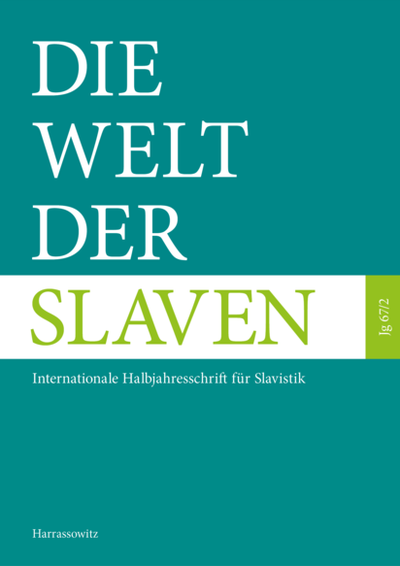(Не)Подлинное бытие в творчестве А. Платонова
(на материалах повести «Сокровенный человек» и рассказов «Фро» и «Река потудань»)
DOI:
https://doi.org/10.13173/WS.67.2.271Schlagwörter:
Heidegger, Platonov, existential, being-to-death, care, authentic and inauthentic beingAbstract
(In)authentic being in the work of A. Platonov (based on the stories “The Innermost Man”, “Fro”, and “The River Potudan’”)
In this article, based on the stories “The Innermost Man” (1927), “Fro” (1936), and “The River Potudan’” (1937), the ideological and artistic originality of A. Platonov’s work is interpreted from the position of M. Heidegger’s philosophical concept of authentic and inauthentic existence. Authentic and inauthentic modes of Heidegger’s existentials being-in-the-world, being-with, and being-toward-death are highlighted in the stories, which are compared with each other on the basis of their belonging to different creative periods: “initial” and “humble prose”. It is shown that the existential of being-in-the-world is presented in an inauthentic mode both in the “humble prose” and in the “initial” period by the motif of indifference and by the heroes’ concern for the “common life” (“The Innermost Man”, “Fro”) and substitute-subordinating care (“The River Potudan’”); the existential of the inauthentic way of existence of being-with; the loss of oneself, “preoccupied with the middle” of the society of others in “The River Potudan’” and “The Secret Man” is an inevitable consequence of caring for a “common life” and caring for another; the existential of being-toward-death in “The Secret Man” is “lived through” by the heroes in the dialectical unity of the genuine and inauthentic modes of existence, and in “The Potudan River” it is presented mainly in the “own” way as their most inherent possibility of presence.
Literaturhinweise
Burxanov, Aleksandr R. 2012. Antropologičeskie smysly Dasein v traktate Martina Xajdeggera «Bytie i vremja». Vestnik Nižnevartovskogo gosudarstvennogo universiteta 2012(3). 19–24.
Demidov, Aleksandr B. 1999. Fenomeny čelovečeskogo bytija. Minsk.
Ėpštejn, Mixail. (2015). Meždu nebytiem i voskreseniem: Andrej Platonov v dialoge s N. Fedorovym, M. Xajdeggerom i V. Nabokovym. Rossica Olomucensia 54(1). 23-43.
Falёv, Egor V. 2008. Germenevtika Martina Xajdeggera. Sankt-Peterburg.
Glušenkova, Olʹga A. 2018. Dekonstrukcija jazyka v sovetskom mentalʹnom prostranstve v kontekste ėkzistenciala «bytie k smerti» (na materiale tekstov A. Platonova). Sibirskij filologičeskij forum 2(2). 41–48.
Grigorʹeva, Nadežda. 2012. Čelovečnoe, besčelovečnoe: Radikalʹnaja antropologija v filosofii, literature i kino konca 1920-x – 1950-x gg. Sankt-Peterburg.
Mixajlov, Igorʹ A. 2010 Bytie-v-mire. In Stёpin, Vjačeslav S. & Gusejnov, Abdusalam A. & Semigin, Gennadij Ju. & Ogurcov, Aleksandr P. (ed.), Novaja filosofskaja ėnciklopedija, t. 1, 345. Moskva.
Penkina, Natalʹja V. 2012. Filosofskie idei prozy Andreja Platonova: Problema čeloveka. Nižnevartovsk.
Platonov, Andrej P. 2011a. Sčastlivaja Moskva: Roman, povestʹ, rasskazy. (Red. Natalʹja V. Kornienko.) Moskva.
Platonov, Andrej P. 2011b. Ėfirnyj trakt: Povesti 1920-x – načala 1930-x godov. (Red. Hina M. Malygina.) Moskva.
Xajdegger, Martin. 1991. Razgovor po proseločnoj doroge: Izbrannye statʹi pozdnego perioda tvorčestva. Moskva.
Xajdegger, Martin. 2003. Bytie i vremja. (Perevod: Vladimir V. Bibixin.) Xarʹkov.

